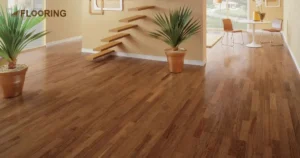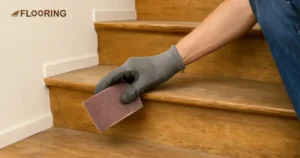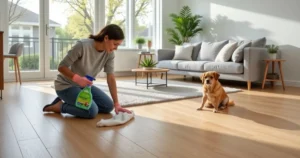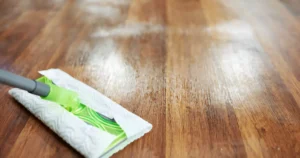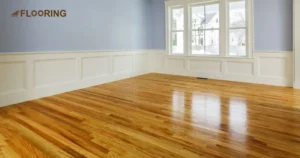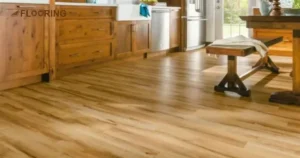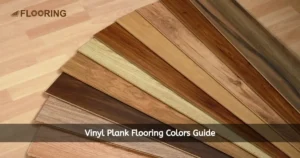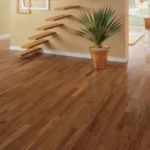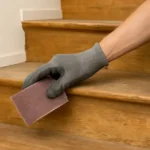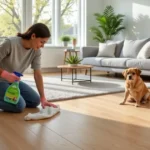Hardwood floors bring warmth and beauty to any home. But keeping them looking their best can be tricky. Many people turn to bleach, thinking it will restore that classic shine. But using bleach on hardwood is a huge no that can permanently damage and dull your expensive floors.
Can you use bleach on hardwood floors? You might think that it’s a tempting solution to tackle tough grime and discolored wood. But Stop! Pouring bleach on your hardwood is one of the worst things you could do. Bleach might seem like a quick fix, but it could permanently ruin your floor’s looks and longevity.
This post will explore why bleach is disastrous for wood. It’ll also help you understand the hidden dangers and share safe alternatives to clean your hardwood without compromising its health. Read on to learn how to properly care for and refresh hardwood floors the right way.
📑 Table of Content
Key Takeaways
- Never use bleach on hardwood floors because it’lll permanently ruin them.
- Bleach strips away wood’s natural color and discolors floors beyond repair.
- The harsh chemicals weaken and break down wood fibers, making floors brittle.
- Bleach damages protective finishes, leaving floors dull, dry, and vulnerable.
- Even small bleach spills open the door to scratches, dents, and future staining.
- Bleaching releases toxic vapors into the air that pose serious health risks.
- If floors were previously bleached, they are compromised forever with no fix.
- Use only gentle, plant-based cleaners designed specifically for hardwood floors.
The Dangers of Bleach on Hardwood Floors

Alarming reality is that bleach poses high risks that can wreck your wood for good. Those toxic chemicals may remove discoloration, but they also strip away your floors’ protective finish and natural look. Also know in details about how to get paint off the vinyl floor.
In the next sections, we’ll explore the specific ways bleach damages hardwood, from discoloration and wood fiber breakdown to scratches, dents, and fading.
Permanent Discoloration
Bleach is notorious for stripping away the natural color and grain of hardwood floors. Even if you only use a light bleach solution, it acts like a potent chemical stripper. Bleach penetrates deep into the hardwood floor, removing pigments that give wood its rich hue.
Weakened Wood Fibers
Beyond discoloration, bleach severely compromises hardwood floor at the core. Its harsh chemicals aggressively eat away and break down wood fibers that make up the structure of each plank. This weakening leaves wood porous, brittle, and prone to swelling, warping, and cracking.
Fading and Dull Finishes
Bleach rapidly dulls and fades any protective finish, whether it’s polyurethane, varnish, or lacquer. That shiny look will disappear as bleach erodes the clear coats that guard your wood. The damage radiates through every inch of flooring. Even professional refinishing can’t revive that lost gleam after bleach exposure.
Chances to Scratches and Dents
Once bleach penetrates through the protective finish, hardwood floors become sitting ducks for scratches and dents. Bleach weakens wood floors so they compress easily under pressure or impact. Protecting wood from these everyday hazards is near impossible after a bleach assault.
Is it Safe to Bleach Wooden Floors?

Bleach and wood simply don’t mix. There are absolutely no safe methods or precautions that make bleaching hardwood floors an acceptable practice. Consider these damning reasons why:
- Bleach always discolors and strips the natural wood color and grain.
- It weakens and degrades wood fibers, making floors brittle and prone to cracking.
- Bleach ruins any protective finish, leaving floors dull and unprotected.
- Even tiny bleach spills or splashes open the door to permanent damage.
- Harsh bleach chemicals pose serious health hazards when released into the air.
- There is no way to control or limit bleach’s penetration into porous wood.
- Floors bleached once will continue to be vulnerable to staining and wear.
- The damage is irreversible, no refinishing or sanding can restore bleached floors.
The responsible thing to do is avoid bleach completely if you want to preserve your beautiful wood floors. Don’t risk decimating their looks, durability and your health.
Harsh Chemicals on Hardwood Floors & Your Health
The threats of bleach and harsh chemicals extend far beyond visible damage. Their toxic nature poses severe risks to your health you probably never considered. When bleach fumes intermingle with the wood’s natural acids, hazardous vapors are released that irritate eyes, skin, and lungs.
Using harsh chemicals can expose you and your family to unacceptable compounds, like chlorine gas and dioxins. Long-term low-level exposure is linked to respiratory issues, hormone disruption, and even cancer.
Is restoring wood color worth that kind of deadly danger lurking in your home? Think twice before using bleach and harsh chemicals’ invisible perils.
Alternatives to Bleach For Wood Flooring

Now that we know bleach is a complete no for hardwood floors, the good news is there are plenty of safe, effective alternatives. With the right cleaners and techniques, you can refresh and revive your wood’s luster without the risks.
Here are some top-recommended bleach substitutes to consider:
| Product/Method | Description |
| Plant-Based Floor Cleaners | Look for gentle, non-toxic formulas made with natural ingredients like vinegar, essential oils, and plant-derived surfactants. These are wood-safe and won’t damage finishes. |
| Enzyme-Based Cleaners | Enzymes break down dirt and grime without harsh chemicals. Choose enzyme cleaners specifically formulated for wood floors. |
| Baking Soda Paste | Make a mild abrasive paste with baking soda and water. Gently scrub to lift stains without damaging wood. |
| Cream of Tartar Solution | Dissolve a bit of cream of tartar in water for a mild acidic solution that can remove some discoloration safely. |
| Wood Floor Polishes | Look for quality polishes that contain carnauba wax or beeswax to nourish wood and restore shine. |
| Professional Deep Cleaning | For periodic deep cleaning and restoration, hire wood floor specialists to thoroughly clean and recoat your floors. |
What if My Floor is Too Far Gone for Bleaching?
Hopefully by now the dangers of using bleach are crystal clear and you’re committed to pursuing only safe, wood-friendly cleaning methods. In the following sections, we’ll explore options for addressing floors that appear beyond repair.
Irreversible Damage
Floors that have been subjected to bleaching at any point in their history have crossed an unforgiving line from which there is no going back. Bleach breaks down fibers and finishes in a way that destabilizes wood permanently.
Even if you have bleached floors professionally resanded and refinished at great expense, you’ll never be able to restore them to their original integrity.
Point of No Return with Bleach

While many floor issues can be corrected with the right care, some damage is truly permanent and irreparable. Years of improper cleaning products, lack of finish maintenance, and environmental exposures can push hardwood past the point of no return. Severe warping, deep gouges, and wood fiber breakdown are almost impossible to fix.
Frequently Asked Questions
Can you mop hardwood floors with bleach and water?
Absolutely not! Cleaning hardwood floors with a mixture of bleach and water is not recommended. Bleach and water will permanently damage and discolor hardwood floors.
Can you lighten hardwood floors with bleach?
Bleach may lighten wood initially, but it causes irreversible damage, stripping color, weakening fibers, and dulling finishes. It’ll be safe to explore professional options for floor lightening.
Do you need to rinse the floor after mopping with bleach?
You should never mop hardwood floors with bleach at all. However, after mopping hardwood floors with bleach, it’s crucial to rinse thoroughly with clean water to remove any residue.
What floors can you mop with bleach?
Bleach is suitable for mopping certain floors like tile or vinyl, but hardwood, laminate, or wood-based floors should never be mopped with bleach. Stick to plant-based cleaners made specifically for wood.
How do you bleach hardwood floors?
Always consult professionals to ensure proper application and avoid damage, when you consider bleaching hardwood floors. It’s recommended you do not bleach hardwood floors under any circumstances.
What solutions can you use to clean hardwood floors?
For daily cleaning of hardwood floors, use solutions designed for hardwood surfaces. Soft cleaners help preserve the floor’s shine and finish while protecting against potential damage.
Conclusion
Hardwood floors are an investment worth protecting. While bleach might seem like a quick fix for discoloration, our guide has shown bleach is not suitable for hardwood floors at all. Don’t risk permanent damage that costs you the beauty, durability, and value of your expensive floors.
Instead, maintain hardwood floors the safe way using gentle, plant-based cleaners and embracing the natural, low-maintenance allure of wood. With some basic care and knowledge, you can revive shine and keep your floors looking their brilliant best for decades.
By steering clear of bleach and embracing wood-safe methods, you’ll maintain the rich character and lasting good health of your hardwood. Your diligence will pay off, avoiding bleach means your floors will continue to warm and enhance your home’s ambiance for generations.

